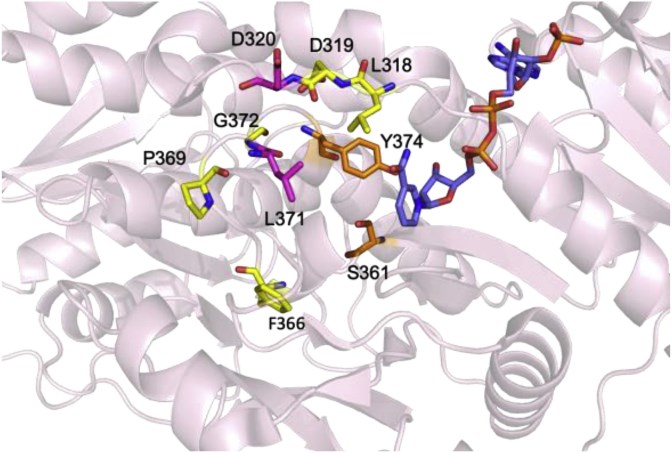CD Biosynsis is a leading expert in the field of enzyme design and evolution, with a long and in-depth experience in enzyme directed evolution. Our dedicated team utilizes evolutionary trace analysis to extract key information from enzyme sequences, providing valuable insights for the rational design of enzymes with improved properties or novel functions.
Overview
Evolutionary trace methods help to identify conserved residues in protein evolution that may play a key role in enzyme structure, function or stability. Based on the evolutionary trace score and the position of the residues in the protein structure, it can provide valuable reference information for prioritizing residues for targeted mutagenesis. Conserved residues with higher scores may have more important functions and may be more suitable for targeted mutagenesis for corresponding in-depth studies.
 Fig 1. Active site of EryKR1. (Drufva EE, et al., 2020)
Fig 1. Active site of EryKR1. (Drufva EE, et al., 2020)
Our Services
Our EnzymoGenius™ platform provides the site-directed mutagenesis services based on the evolutionary trace method, enabling researchers to better carry out enzyme engineering studies and applications.
For guiding site-directed mutagenesis through evolutionary trace method, we can provide the following service process.

- Design Mutagenesis Primers
Oligonucleotide primers are first designed to introduce mutations in selected residue sequences. When designing primers, it is important to note that the mutations introduced are specific to the residues and do not introduce other unexpected changes.
- Perform Site-Directed Mutagenesis
Carry out the site-directed mutagenesis using the designed primers and introduce the mutations into the gene encoding the target enzyme.
- Expression and Functional Analysis
Express the mutated enzyme and perform functional assays to assess the impact of the mutations on enzyme activity, stability, and any other relevant properties.
- Iterative Optimization
If needed, perform additional rounds of mutagenesis to optimize the desired properties. Use the insights gained from the initial round of mutagenesis and functional analysis to guide further modifications.
- Validation
Validate the success of the site-directed mutagenesis by comparing the properties of the mutated enzyme with the wild-type enzyme. Use biochemical and biophysical assays to confirm the desired effects of the introduced mutations.
Advantages of Our Services
- Professional Scientific Team
We have a professional research team of scientists with decades of experience in the field of enzyme design and evolution, focusing on the directed evolution and rational design of enzymes, and are committed to providing the greatest impetus for enzyme biology research.
- AI-assisted Development and Design
Combined with our advantage in AI applications, our EnzymoGenius™ platform enables the application of AI-assisted modeling to evolutionary trace methods, resulting in a powerful increase in predictive efficiency.
- High-quality Services
We have a team of highly skilled and experienced scientists with in-depth knowledge of enzyme design evolution, who can provide you with professional consulting services before the project and reliable support services after the sale.
CD Biosynsis strives to offer comprehensive and reliable enzyme evolution trace analysis for various applications, whether academic research, industrial applications, or biotechnological development, our services are tailored to meet your specific requirements. Contact us today to learn more about our enzyme evolutionary trace analysis services and how they can benefit your research or development projects. Our team is ready to assist you and provide the insights you need to achieve your goals.
Reference
- Drufva, EE.; et al. Site directed mutagenesis as a precision tool to enable synthetic biology with engineered modular polyketide synthases. Synth Syst Biotechnol. 2020, 5(2):62-80.

































 Fig 1. Active site of EryKR1. (Drufva EE, et al., 2020)
Fig 1. Active site of EryKR1. (Drufva EE, et al., 2020) 